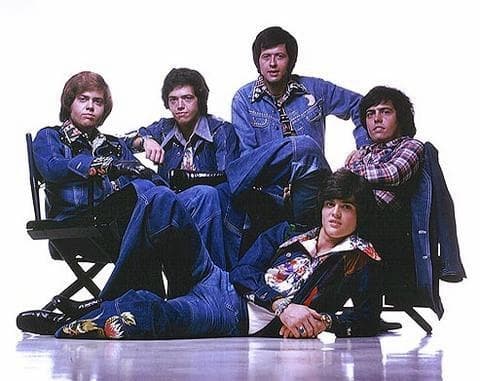
A GENUINE CALL TO HUMANITY—FREELY GIVEN, FAR‑REACHING
The opening chords of “SEND A LITTLE LOVE” by The Osmonds emerge as more than a pop ballad — they arrive as a heartfelt summons to kindness and unity. Appearing on their 1974 studio album Love Me for a Reason, this song is nestled among tracks framed for broad appeal — though it did not break into major singles charts, the album itself reached No. 47 on the US Billboard 200. With the Osmonds stepping back from their earlier rock‑pop mode into softer, professionally penned material, this piece stands out for its earnest simplicity and spiritual resonance.
In a career punctuated by chart‑toppers like “Love Me for a Reason”, the Osmonds here turn their harmonies toward a different kind of triumph: the triumph of goodwill over glamour. The album on which “Send a Little Love” appears was released on November 2, 1974, produced by Mike Curb and arranged by H. B. Barnum. While “Send a Little Love” was not issued as a major single in the manner of their UK No. 1 hit, the song nonetheless captures a moment when the group used their platform for an un‑populated plea: not swirling melodramas or teenage heartbreak, but a boundary‑crossing call for love and connectedness.
Lyrically, the song unfolds with calculated directness. Lines like “Let’s send a little love all around the world / For every man, woman, boy and girl / And hope someday we all will live as one” translate the Osmonds’ wholesome image into global aspiration. The writing isn’t full of metaphor or narrative complexity — rather it leans into the familiar and the communal: love as action, unity as goal, compassion as currency. The refrain becomes a communal mantra rather than a personal confession. It suggests a world‑outlook rather than merely a romantic one.
Musically, the arrangement reflects the group’s shift at this point in their career: smooth vocals, layered harmonies, and a warm pop‑ballad production that foregrounds the message rather than distracts with instrumental flashiness. The album’s broader context is illuminating: after their more rock‑oriented efforts on albums such as The Plan (1973), which carried more explicit Mormon‑themed content, the Osmonds consciously pivoted toward accessible, mainstream pop with broader lyrical reach. “Send a Little Love” sits in the heart of that pivot: less doctrinal, more universal.
What gives the song its enduring value is its sincerity. The Osmonds, known for their clean‑cut family image and faith‑anchored background, here translate their convictions into inclusive language. They don’t sermonize; they invite. They don’t dwell in specifics; they propose a shared sentiment. The phrase “there could be a big bright tomorrow but first we’ve got to stop and make a start” exemplifies the forward‑looking hope rooted in grounded action. In this sense, the song functions not just as pop entertainment, but as a cultural artifact of a 1970s moment when pop‑music voices occasionally stepped into social terrain.
In the arc of the Osmonds’ career, “Send a Little Love” may not have dominated charts, but it flowed from the same wellspring that yielded their biggest hits: powerful vocal unity, an emotional sincerity, and a desire to leave something positive behind. That it didn’t become a massive hit does not diminish its resonance; instead, it offers a quieter, perhaps purer expression of the band’s ethos. The solace it offers lies less in novelty and more in its cordial invitation: a reminder that harmony isn’t only musical, but human. For listeners today, the track stands as a gentle relay from a past era of pop music, urging us still to send a little love.